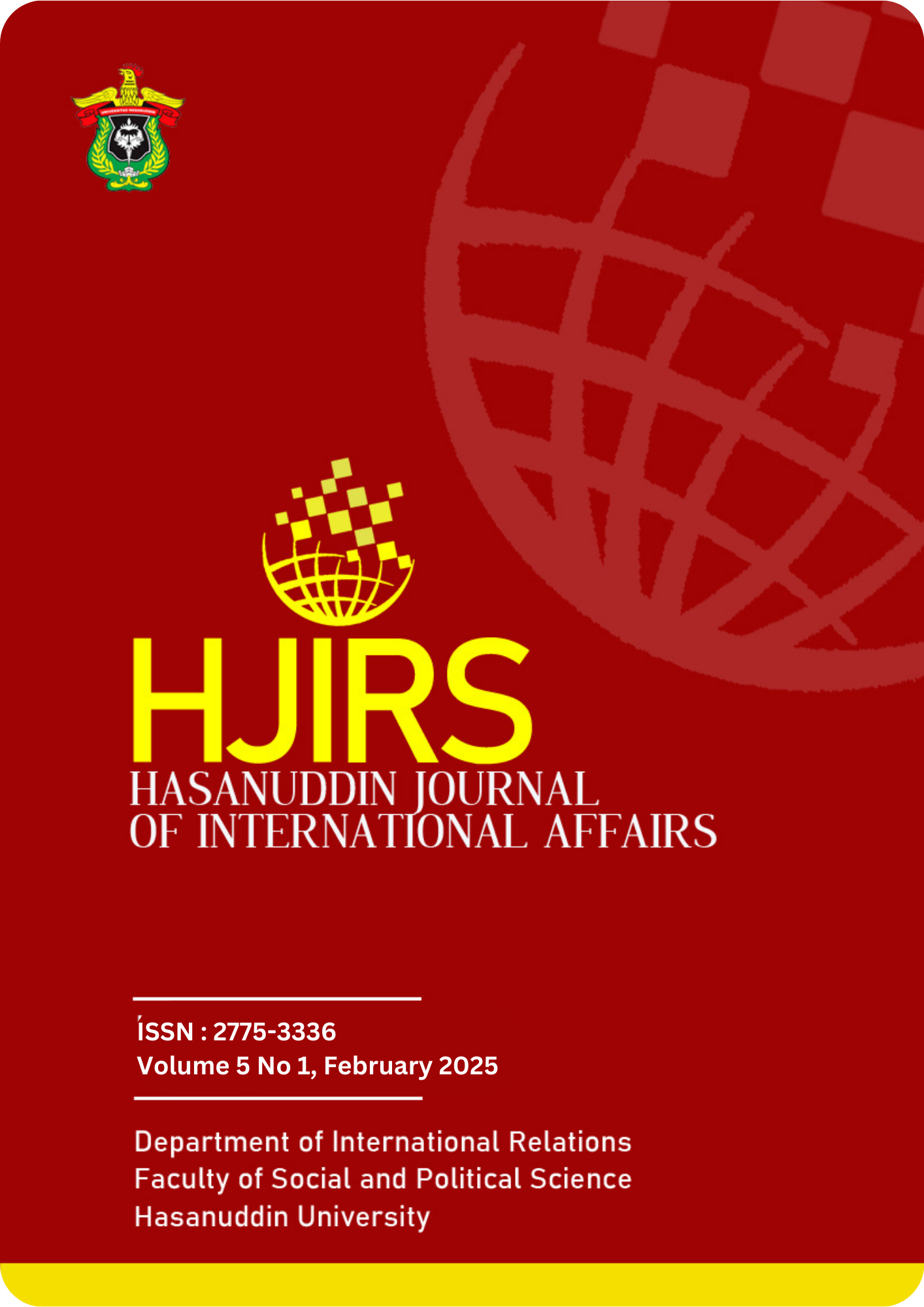Main Article Content
Abstract
This research objective is to explain the use of treaty shoping ini commercial diplomacy today. Nowdays the foreign investors resort to treaty shopping, by which they require host countries to perform unintended obligations. Treaty shopping allows foreign investors to find some connecting factors with the third country BIT concluded with the host country, by disregarding the BIT their home country concluded with that specific host country to find more protection for their investments. is a very serious problem for the host countries. Against this backdrop, this article critically analyzes the approaches of dissecting treaty shopping in commercial diplomacy. Investment agreements are used as primary source of data while literatures and reports are relied upon as secondary source of data. The article identifies the magnitude of challenges faced especially by host countries in concluding and implementing investment agreements. It recommends States to be curious and properly utilize the art of negotiation in their commercial diplomacy.
Keywords
Article Details
References
- Blyschak, P. M. (2011a). Access and advantage expanded: Mobil Corporation v. Venezuela and other recent arbitration awards on treaty shopping. Journal of World Energy Law & Business, 4(1), 32-39.
- Charles N. Brower & Stephan W. Schill, (2009); Is Arbitration a Threat or a Boon to the Legitimaci of International Investment La ii? 9 CHI. J. INT'L L.
- Christopher Whytock, (2011); The evolving forum shopping system, 96 Cornell Law Review 481.
- Eunjung Lee, (February, 2015), Treaty Shoping in International Investment Arbitration; How Often It has Occurred and how has It been Perceived by Tribunals? Department of International Development, London School of Economics and Political Science, Available on www.lse.ac.uk/depts / ID.
- Dolzer R. and Schreuer C., (2008), Principles of International Investment Law (Oxford University Press).
- E. Lee, (2015), Treaty Shopping in International Investment Arbitration: How often has it occurred and how has it been perceived by tribunals? Department of International Development, London School of Economics and Political Science, London, Available at www.lse.ac.uk/depts/ID.
- European Parliament. (2011). European Parliament resolution of 6 April 2011 on the future European international investment policy (2010/2203(INI)). Available on http://www.europarl.europa.eu/sides/getDoc.do?pubRef=-//EP//TEXT+TA+P7-TA-2011.
- Gaukrodger, D. & Gordon, K. (2012). Investor-State Dispute Settlement: A Scoping Paper for the Investment Policy Community. (OECD Working Papers on International Investment, 2012/03). Paris: OECD Publishing.
- Jonathan Bonnitcha, Assessing the Impacts of Investment Treaties, Overview of the Evidence, International Institute for Sustainable Development Report, (September, 2017).
- Judge Stephen M. Schwebel, (2009); The Overwhelming Benefits of Bilateral Investment Treaties, Remarks at Suffolk University Law School (Oct. 31, 2008), in 32 SUFFOLK TRANSNAT'L L. REv. 263
- Julien Chaisse, (2015); The Treaty Shopping Practice: Corporate Structuring and Restructuring to Gain Access to Investment Treaties and Arbitration, 11 Hastings Bus. L.J. 225. Available at: https://repository.uchastings.edu/hastings_business_law_journal/vol11 /iss2/1 .
- Julie A. Maupin, (2011); MLEN-Based Jurisdiction in Investor-State Arbitration: Is There An Hope for a Consistent Approach?, 14 J. INT'L ECON. L. 157.
- Stephan W. Schill, (2011) Enhancing International Investment Laws Legitimaci: Conceptual and Methodological Foundations of a New Public Law Approach, 52 VA. J. INT'L L. 57.
- UNCTAD. (2013). World Investment Report 2013 (Global Value Chains: Investment and Trade for Development). New York and Geneva: United Nations.
- Van Harten, G., (2010), Five Justifications for Investment Treaties: A Critical Discussion. Trade, Law and Development, 2(1).
References
Blyschak, P. M. (2011a). Access and advantage expanded: Mobil Corporation v. Venezuela and other recent arbitration awards on treaty shopping. Journal of World Energy Law & Business, 4(1), 32-39.
Charles N. Brower & Stephan W. Schill, (2009); Is Arbitration a Threat or a Boon to the Legitimaci of International Investment La ii? 9 CHI. J. INT'L L.
Christopher Whytock, (2011); The evolving forum shopping system, 96 Cornell Law Review 481.
Eunjung Lee, (February, 2015), Treaty Shoping in International Investment Arbitration; How Often It has Occurred and how has It been Perceived by Tribunals? Department of International Development, London School of Economics and Political Science, Available on www.lse.ac.uk/depts / ID.
Dolzer R. and Schreuer C., (2008), Principles of International Investment Law (Oxford University Press).
E. Lee, (2015), Treaty Shopping in International Investment Arbitration: How often has it occurred and how has it been perceived by tribunals? Department of International Development, London School of Economics and Political Science, London, Available at www.lse.ac.uk/depts/ID.
European Parliament. (2011). European Parliament resolution of 6 April 2011 on the future European international investment policy (2010/2203(INI)). Available on http://www.europarl.europa.eu/sides/getDoc.do?pubRef=-//EP//TEXT+TA+P7-TA-2011.
Gaukrodger, D. & Gordon, K. (2012). Investor-State Dispute Settlement: A Scoping Paper for the Investment Policy Community. (OECD Working Papers on International Investment, 2012/03). Paris: OECD Publishing.
Jonathan Bonnitcha, Assessing the Impacts of Investment Treaties, Overview of the Evidence, International Institute for Sustainable Development Report, (September, 2017).
Judge Stephen M. Schwebel, (2009); The Overwhelming Benefits of Bilateral Investment Treaties, Remarks at Suffolk University Law School (Oct. 31, 2008), in 32 SUFFOLK TRANSNAT'L L. REv. 263
Julien Chaisse, (2015); The Treaty Shopping Practice: Corporate Structuring and Restructuring to Gain Access to Investment Treaties and Arbitration, 11 Hastings Bus. L.J. 225. Available at: https://repository.uchastings.edu/hastings_business_law_journal/vol11 /iss2/1 .
Julie A. Maupin, (2011); MLEN-Based Jurisdiction in Investor-State Arbitration: Is There An Hope for a Consistent Approach?, 14 J. INT'L ECON. L. 157.
Stephan W. Schill, (2011) Enhancing International Investment Laws Legitimaci: Conceptual and Methodological Foundations of a New Public Law Approach, 52 VA. J. INT'L L. 57.
UNCTAD. (2013). World Investment Report 2013 (Global Value Chains: Investment and Trade for Development). New York and Geneva: United Nations.
Van Harten, G., (2010), Five Justifications for Investment Treaties: A Critical Discussion. Trade, Law and Development, 2(1).
